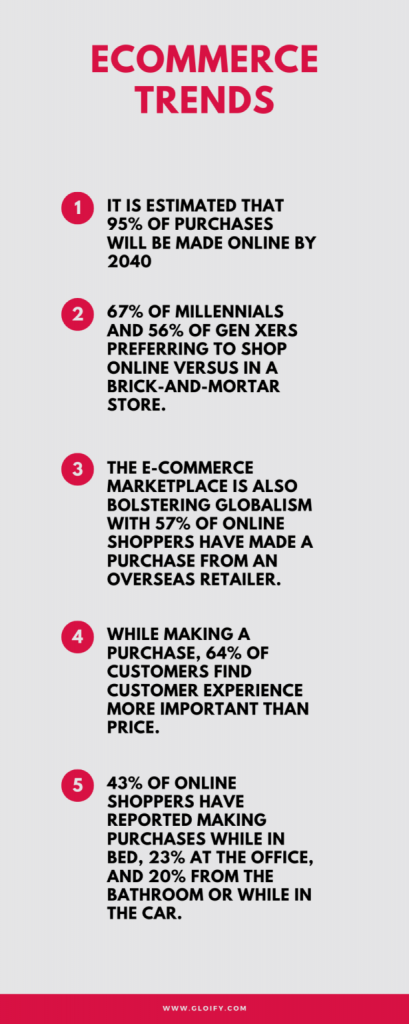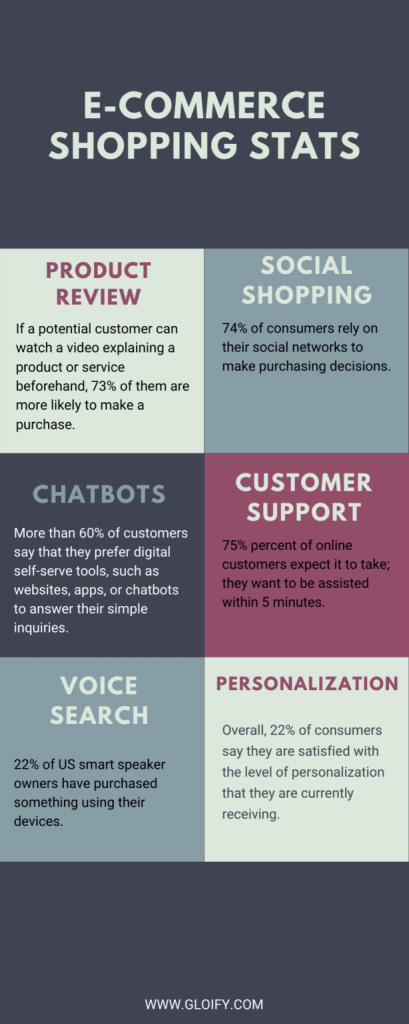AI, Machine Learning and Big data have become a huge trend for all tech companies. Major tech firms such as Facebook, IBM, and Yahoo have already publicly expressed their focus on developing artificial intelligence as a new source of business. And every company working on these technologies to add more value to their business. Google’s recent £400m purchase of start-up DeepMind, is clearly showing that AI is set to go into turbo drive in the next couple of years. In this post, 7 ways to use machine learning for e-commerce we have tried to give you an overview of the same.
Data is the most crucial part of Machine Learning and Artificial Intelligence (AI). The thing is e-commerce companies have a lot of data at their fingertips. But making use of that data is a challenge. Utilizing the data with Machine learning can help eCommerce development companies take the customer experience to a whole new level. E-commerce – is one of the first industries that started using all the benefits of machine learning. Zalando, Asos – companies that have entire artificial intelligence (AI), deep learning departments. They invest a lot of money to have a better knowledge of their customers, personalize offers to the individual customers, improve customer experience and automate manual processes.
Also Read, Machine Learning – The Next Big Thing in Our Life
7 ways to use machine learning for E-commerce
The growing demands of online shopping and buying different items from a single online store have changed the customer’s buying behaviors. All the e-commerce companies are investing a lot of money in technology to improve their customer experience and provide them all the convenience that a traditional salesman offers them in a physical store. Here the 7 ways how e-commerce companies can get the benefits of machine learning-
Also Read, How to Start an E-commerce Business in India

- Personalized Customer Experience
- Improved Product Search
- Price Optimization
- Product Recommendations
- Eliminate Fraud
- Retargeting, Discount & Upsells
- Customer Support
1.Personalized Customer Experience
Properly personalized products for user’s needs can increase conversion, and customer engagement. If you are looking for sports shoes on Flipkart or Amazon, no surprise that the next day you might be getting a notification that 40% off on sport shoe brands, that you have added in your cart. Personalization is nothing new for e-commerce and if you frequently use different e-commerce sites then you’ll know exactly what we’re referring to.
Whereas AI-based personalization for e-commerce takes the multi-channel approach. It monitors user activity on how users are interacting with your e-commerce platform, using the mobile application, website or other referral platforms. This is where machine learning makes an impact. Machine learning technology makes it possible to provide optimized experiences that drive sales and increase revenue.
2.Improved Product Search
If you are looking for products to buy online, then you might search for it on the search engine or any particular e-commerce website, and if you are not finding the right product that you are looking for, chances are that you will switch to some other e-commerce websites. And it will be a loss for the e-commerce company. In this fast-moving life, every user wants quick response to their query, whether its a Google or e-commerce site. In this competitive phase, every e-commerce company has a very short time to grab the user’s attention by providing them with relevant products for their search query.
Previously, product searches fall short of delivering results that truly answer the query. But using Machine Learning in e-commerce has enabled it to pull information from deep within the patterns of search and purchases of users rather than just keywords. And providing them the most relevant products for their search results.

3.Price Optimization
Every online shopper always looking for a discount, and great deals to find a product to value for their money. It clearly shows that pricing matters a lot for online buyers and they always look for the least price for products. Prices for the products can fluctuate a great deal depending on dozens, if not hundreds of variables, it’s easier than ever to compare prices from one website to another with just a few clicks.
Pricing is one of the main categories, where Machine Learning is providing a great deal of support to the businesses, in Price Optimization. A pricing engine can be created to take into account a great deal of information about the buyer’s profile, market trends, competitive prices, product abandonment rates, and much more, and determine what percentage discount to offer the shopper on a specific product in order to increase the potential of making the sale.
4.Product Recommendations
If you know what your customer looking to buy and what’s inside the head of your average customers. And what makes them tick. You can easily recommend them a variety of products with a limited deal, then they will probably end up buying the product. Here the machine learning can bring that opportunity to identify trends and discovering patterns from sets of data, Amazon Recommendation Engine is responsible for 35% of its sales.
A recommendation engine takes in past user behavior analytics information as training data and a lot of computing power to find the right patterns in product sales and shopping behavior. After analyzing millions upon millions of records of these purchasing habits of users, the Recommendation engine will predict how a new user may end up browsing site, or products they may be interested to buy, based on their browsing habits and items they added in their shopping cart.
5. Eliminate Fraud
E-commerce fraud has already grown by nearly 60% since 2016, according to Experian, and that’s just the beginning. With scammers getting increasingly sophisticated, it becomes essential to have a fraud-prevention system in place.E-commerce fraud is painful for customers and as well for the e-commerce merchant. E-commerce fraud has already grown by nearly 60% since 2016, according to Experian, with an increasing number of scammers all the e-commerce are well aware and working on it to prevent fraud long back.
E-commerce merchants need to be careful not to lose customers and revenue in an attempt to prevent fraud. if a merchant allows a fraudulent transaction through unintentionally they are liable to a chargeback plus fees and penalties on top. Not only does the merchant lose the goods shipped, but they also pay a penalty fee. A machine learning system can analyze data about normal customer behavior, such as registered devices, frequent login time, location, etc., and then use that to identify abnormal account activity.
6.Retargeting, Discount & Upsells
Not all the buyers who visit your website complete the purchase, many of the potential customers who visit the website add products to cart, and eventually leave without completing the transaction. According to Conversica, at least 33% of marketing leads are not followed up by the sales team. Result companies may lose many potential customers without retaining them.
Using Machine Learning in e-commerce can help to Retargeting campaigns that can be executed to reach out to previous customers who have bought, abandoned a cart, or just browsing your website. And these campaigns can be performed by Machine Learning algorithms by looking at previous data of similar shopper profiles and how they may have been converted in the past via retargeting. It even offers various discounts and limited deals which makes it tempting customers to buy the products on huge discounts. With the help of Machine Learning, e-commerce merchants can easily retain their potential customers.
7.Customer Support
We all know e-commerce is a very competitive business industry, and customers are not just expecting their orders to deliver to them in the right condition and within a short period of time. In traditional shopping whenever a customer any question or doubt they easily get their answer by the shop owner or the salesman.
While shopping online a customer expects a good product with the quality of customer support. Providing quality customer service in e-commerce is challenging and helping an individual for query and providing them satisfactory customer service is not an easy job. Chatbots can actively take on some of the important responsibilities that come with running an online business, particularly when it comes to executing tasks for operations and marketing. Chatbots can automate order processes and are an effective and low-cost way of providing customer service. And automating customer support can lead to having higher customer satisfaction.
E-commerce is changing the whole shopping concept for buyers, providing different services such as easy return, a wide range of products and one-day delivery. This attracting users to shop online, while e-commerce companies are continuously improving their service and customer support. With advanced technologies like Machine Learning And AI, we can expect a broad picture of e-commerce in the coming future.

